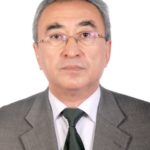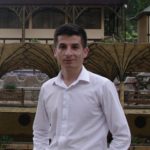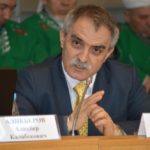Dr. Saodat Olimova, TEW-CCA Co-Coordinator Tajikistan
 Dr. Saodat Olimova is a sociologist and the director of SHARQ (ORIENS) Research Center (Dushanbe, Tajikistan). Her main fields of activity and interest are migration studies, Islam, political and social issues in Central Asia, the post-Soviet transition of societies and states in Central Asia. Previously, Dr. Olimova worked as a researcher at the Institute of Philosophy and Law of the Tajik Academy of Sciences. Later, she served as the head of the department at the Institute of World Economy & International Relations of the Tajik Academy of Sciences. In the past decade, Dr. Olimova worked as an expert at the al-Farabi Carnegie Program on Central Asia (Kazakhstan) and as a representative in Tajikistan of the academic journal “Central Asia and the Caucasus” (published in Sweden). Dr. Olimova participated in large-scale international collaborative projects such as the “Central Asian Youth Study” (funded by Friedrich Ebert Foundation, 2013-2014), “Human Capital Development and Equity” (funded by the European Training Foundation, 2009-2010), “Remittances and Poverty in Central Asia and South Caucasus” (funded by Asian Development Bank, 2006-2008). Dr. Olimova served as a consultant for research projects commissioned by the World Bank, Asian Development Bank, UNICEF, UNDP, UNESCO, IOM, ILO, etc. In addition, Dr. Olimova participated as an expert in the IMF Caucasus and Central Asia Regional Advisory Group (Washington, DC), World Health Organization expert advisory group (Copenhagen), International Research Council on Migration (Moscow), and International Association of Oriental studies (Moscow). Dr. Olimova has received individual research grants from MacArthur Foundation, Foundation de La Maison de Science de l’Homme, Russian Foundation for Fundamental Research, Open Society Institute, etc. Dr. Olimova has published many research articles and papers.
Dr. Saodat Olimova is a sociologist and the director of SHARQ (ORIENS) Research Center (Dushanbe, Tajikistan). Her main fields of activity and interest are migration studies, Islam, political and social issues in Central Asia, the post-Soviet transition of societies and states in Central Asia. Previously, Dr. Olimova worked as a researcher at the Institute of Philosophy and Law of the Tajik Academy of Sciences. Later, she served as the head of the department at the Institute of World Economy & International Relations of the Tajik Academy of Sciences. In the past decade, Dr. Olimova worked as an expert at the al-Farabi Carnegie Program on Central Asia (Kazakhstan) and as a representative in Tajikistan of the academic journal “Central Asia and the Caucasus” (published in Sweden). Dr. Olimova participated in large-scale international collaborative projects such as the “Central Asian Youth Study” (funded by Friedrich Ebert Foundation, 2013-2014), “Human Capital Development and Equity” (funded by the European Training Foundation, 2009-2010), “Remittances and Poverty in Central Asia and South Caucasus” (funded by Asian Development Bank, 2006-2008). Dr. Olimova served as a consultant for research projects commissioned by the World Bank, Asian Development Bank, UNICEF, UNDP, UNESCO, IOM, ILO, etc. In addition, Dr. Olimova participated as an expert in the IMF Caucasus and Central Asia Regional Advisory Group (Washington, DC), World Health Organization expert advisory group (Copenhagen), International Research Council on Migration (Moscow), and International Association of Oriental studies (Moscow). Dr. Olimova has received individual research grants from MacArthur Foundation, Foundation de La Maison de Science de l’Homme, Russian Foundation for Fundamental Research, Open Society Institute, etc. Dr. Olimova has published many research articles and papers.
Why TEW-CCA project? I’ve been studying the process of post-communist transition of Central Asian societies for more than two decades. I find that the deep changes in the worldviews of people transform economic, political, and social aspects of our society. The transformation affects traditional spheres of employment, social and economic institutions and relationships, political and economic goals, social and religious norms, family values, and attitudes toward education, employment, and religion. The process of transformation mainly affects the youth. At the same time, the youth determine the path of the country’s future development. The relationship between the youth and the process of transformation has become my major topic of interest. In particular, I am interested in studying the labor market for young employees, child labor, the migration, social inclusion and religious life of the youth. My first experience with research related to the youth took place in 2000, when I participated in the study of the youth values in Tajikistan and the youth labor market, in the framework of the UNESCO study „Governance, Youth Values and Life Styles in Central Asian Countries“ (2000-2001). In the current study of the transition from education to work, I welcome the opportunity to explore the dynamic changes in the transition from school to work, explore the trends in youth employment, understand the patterns of youth unemployment and inclusion, and study the effect of formal and informal institutions on the youth in the context of transition to adulthood. I especially like the fact that this study is comparative in nature. This allows me to identify the patterns and the characteristics of transition in various post-Soviet countries, which is especially important for me since I am interested in studying socio-cultural and religious factors of transition. I also welcome the opportunity to collaborate with younger colleagues and researchers, since my interaction with younger colleagues will help me to better understand the needs and the aspiration of the youth and at the same time will allow me to pass on my knowledge and experience.
Prof. Dr. Subhon Ashurov, TEW-CCA Co-Coordinator Tajikistan
 Prof. Dr. Subhon Ashurov, an economist, is Professor for Labour Market and Labour Resource Development at the Technological University of Tajikistan, Dushanbe. Moreover, he is chairman of the Vocational Education and Training Support Foundation (VETSF) of Tajikistan. From 2003 to 2010 he was Deputy Minister of Labour and Social Protection of the Population of Tajikistan, mainly responsible for the development and implementation of VET reforms, labour market reforms and employment policy. Before, from 1997 to 2003, he was Deputy Chief of the Youth Committee under the Government of Tajikistan, mainly responsible for the development and implementation of youth state policy in the social protection and youth education area. Furthermore, he held several positions in university administration as a dean, vice rector and director.
Prof. Dr. Subhon Ashurov, an economist, is Professor for Labour Market and Labour Resource Development at the Technological University of Tajikistan, Dushanbe. Moreover, he is chairman of the Vocational Education and Training Support Foundation (VETSF) of Tajikistan. From 2003 to 2010 he was Deputy Minister of Labour and Social Protection of the Population of Tajikistan, mainly responsible for the development and implementation of VET reforms, labour market reforms and employment policy. Before, from 1997 to 2003, he was Deputy Chief of the Youth Committee under the Government of Tajikistan, mainly responsible for the development and implementation of youth state policy in the social protection and youth education area. Furthermore, he held several positions in university administration as a dean, vice rector and director.
Why TEW-CCA project? Since my childhood I have loved mathematics. After graduating from the Faculty of Mechanics and Mathematics, the National University of Tajikistan, with honors I admitted to the postgraduate courses of the Institute of Mathematics of the Academy of Sciences of Ukraine, which was one of the leading mathematical schools in the former Soviet Union. Ph.D. thesis defended in the field of theoretical mathematics on the basis properties of the root vectors of polynomial operator bundles. Nevertheless, I wanted to apply mathematics to economics. In the period from 1997-2003, I served as Deputy Minister of Youth of Tajikistan and worked to promote youth employment. Then, in the period from 2006-2010, I was appointed Deputy Minister of Labour and Employment of the Republic of Tajikistan and was in charge of employment and vocational education and training of labor resources. These occupations have defined my further research as a scientist. Therefore, my doctoral dissertation was devoted to the issues of formation and regulation of the labour market in terms of its labor surplus. I have developed a mathematical model of this process. Recently I am engaging in issues of the process of vocational education and training of labor resources oriented to the labor market needs. The purpose and objectives of this project correspond to my research interests. Furthermore, in Tajikistan during the last 25 years of independence, a research on the transition from education to work was only conducted twice (in 2007 and 2013). I am confident that the results of this project will contribute to the further development of Tajikistan’s state policy in the promotion of youth employment.
Loikdzhon Mirov, Ph.D. fellow within the TEW-CCA project
 Mirov Loikdzhon is a Ph.D. student at Technological University of Tajikistan since 2015. In 2010 he graduated from Tajik Technical University where he got his Specialist ( 5 years) degree on Computer Science. Since 2008 he is working in SHARQ Research Center as an IT-specialist and since 2011 as a researcher.
Mirov Loikdzhon is a Ph.D. student at Technological University of Tajikistan since 2015. In 2010 he graduated from Tajik Technical University where he got his Specialist ( 5 years) degree on Computer Science. Since 2008 he is working in SHARQ Research Center as an IT-specialist and since 2011 as a researcher.
Why TEW-CCA project? Tajikistan has a young population, as its’ own age. It is passing its’ transition to globalization, market economy and open-door-country. Through this track, it is facing many problems. Excess of labor force makes youth’ education-to-work transition difficult. As the pressure of boiled water under the summer sun of this sunny country, it makes his young people leave the country in search of a job. More than half of youth people pass their transition in outdoor migration. The local labor market competition for vacancies is very high. These two labor markets for Tajik youth are very different. In some cases, low educated workers are more successful than workers with higher education. Not every time peoples excellent students become successful workers. Different institutions play different roles on this track. Also a lot of other problems that could be studied. As one of the young men of Tajik Youth’ Pool, after my graduation from university, I thought about job looking problems. I asked myself why that guy who has not been attending lessons at university is working in a good job, but another with excellent marks is looking for a job? Why one who has a higher education is asking another to find a job for him in migration labor market? What is intersection (cross point) of the line of success in different levels of education? And a lot of other questions. I think being part of this project and also being part of a group of experts will help me to find answers to the questions above. Furthermore, it will become a breaking point for my personal growth and my career.
Prof. Dr. Muzaffar Olimov, TEW-CCA Research Associate
 According to the basic education, I am a historian and medievalist. At the years of my studies in post-graduate courses (1978-1982) at the Institute of Oriental Studies, former Soviet Union and the Russian Academy of Sciences (1990-1994) and also at the years of my works at the Institute of Oriental Studies and Institute of World Economy and International Studies Tajik Academy of Sciences in the fields of my interest has always been the history, historiography and political science. The crash of the former Soviet Union (1991) and transit problems of post-soviet republics, including Tajikistan and all of Central Asia essentially broaden the scope of my academic activities. Establishment of an independent SHARQ (ORIENS) Research Center (1996) and the implementation of a number projects for the study of transit, Islam, migrations, inter-Tajik conflict, security, extremism, terrorism, development of Tajikistan, youth , education, human capital etc. at the centre of my research interests.
According to the basic education, I am a historian and medievalist. At the years of my studies in post-graduate courses (1978-1982) at the Institute of Oriental Studies, former Soviet Union and the Russian Academy of Sciences (1990-1994) and also at the years of my works at the Institute of Oriental Studies and Institute of World Economy and International Studies Tajik Academy of Sciences in the fields of my interest has always been the history, historiography and political science. The crash of the former Soviet Union (1991) and transit problems of post-soviet republics, including Tajikistan and all of Central Asia essentially broaden the scope of my academic activities. Establishment of an independent SHARQ (ORIENS) Research Center (1996) and the implementation of a number projects for the study of transit, Islam, migrations, inter-Tajik conflict, security, extremism, terrorism, development of Tajikistan, youth , education, human capital etc. at the centre of my research interests.
Why TEW-CCA project? Tajikistan is a country of youth and children so the theme of youth, youth values and lifestyle, education, job and mobility are very important for us. These themes are the focus of several research projects, which were implemented in our Center with the support of international organizations youth in the past 15 years. My participation in the project „Opportunities and Barriers at the Transition from Education to Work. A Comparative Youth Study in Azerbaijan, Georgia and Tajikistan“ is undoubtedly important for me. I very glad to work with our partners in the deep study of Youth in our countries and to draw up practical recommendations for the development of youth resources.
Jamshed Kuddusov, TEW-CCA Research Associate
 Jamshed Quddusov, a sociologist and expert in the labor market, is a practitioner, specializing in research of labor market policies, employment, labor migration, vocational education and child labor as well as advocacy related to such issues. In addition, he is the director of the Research Center „Sotsservis“ (Social services) and a member of the Board of the Association of Adult Education in Tajikistan. Since 2004 he has been collaborating with the research center „SHARQ“/ ORIENS.
Jamshed Quddusov, a sociologist and expert in the labor market, is a practitioner, specializing in research of labor market policies, employment, labor migration, vocational education and child labor as well as advocacy related to such issues. In addition, he is the director of the Research Center „Sotsservis“ (Social services) and a member of the Board of the Association of Adult Education in Tajikistan. Since 2004 he has been collaborating with the research center „SHARQ“/ ORIENS.
He worked as the head of the Labor Market and Employment Department of the Ministry of Labor and Social Protection of the Population of Tajikistan from 1998 to 2004. During this period, he developed a new version of the Law of the Republic of Tajikistan „On the promotion of employment“, approved later by Parliament in 2003, and was the author of various stages in the development of national programs to promote employment, engaged in the development of labor market statistics. From 2004 to 2009 he worked as the coordinator of various ILO projects in the field of migration and employment. Since 2008, he established the research center „Sotsservis“ (Social services). This center became an active participant in the development of the following policy and policy documents: the Strategy for External Labor Migration for the period 2011-2015 (approved by the Government in 2011), the State Labor Market Development Strategy until 2020 (approved in June 2011), the National Development Strategy education until 2020 (approved in June 2012) and many other documents. In 2017 (February 27), with his direct participation, the Law of the Republic of Tajikistan „On Adult Education“ was adopted, which laid the foundation for the introduction of the principles of „Lifelong Learning“ (LLL) in Tajikistan. The development of all these documents was based on sociological and scientific studies in which J.Quddusov was an active participant and author.
Why the TEW-CCA project? Since 1998 I have been studying the problems of the labor market in Tajikistan, which, having a young population, is undergoing an economic and social transformation. It is young people who are the most vulnerable in this process. The practice has shown that success in the labor market largely depends on the quality of education and the ability to quickly gain work experience. Therefore, I was interested in the problem of communication between education and the labor market. For the first time, I encountered this topic in 2007, when the Center for Strategic Studies with the support of ILO-IPEC conducted the first study in Tajikistan on the transition from education to work, where I was involved as an ILO consultant. Although this study was not officially published, the experience gained and knowledge allowed further study this topic in more detail. Therefore, in 2012-2013, with the support of ETF, the „Sotsservis“ (Social services) Research Center conducted a second large-scale study of the transition from education to work, where I was the author of an analytical report published in 2014.
In the current study of the transition from education to work, I had an opportunity to study the dynamics of the process change for the period from 2012 to 2017. This study covers not only young people under the age of 30 but also allows to study the problems of transition from education to work of the adult population from 30 to 35 years. In addition, the comparison of data similar to the structure of the population of Azerbaijan and Georgia allows us to consider various aspects of this subject and to develop adequate proposals for Tajikistan for future policy in the labor market. This work has become an important incentive for me to start seriously doing scientific research and prepare a thesis for further protection of the degree of candidate of economic sciences. At the moment I am an applicant for a scientific degree in the Research Institute of Labor, Migration, and Employment at the relevant Ministry. In addition, this work and the opportunity to work with more experienced colleagues and scientists will be an important moment for my further professional growth.
